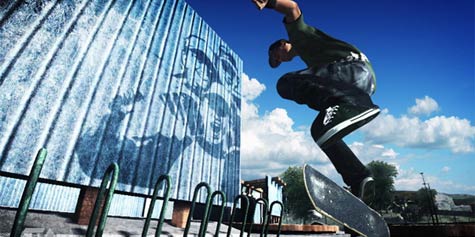-
"You know the [dark days] when all the MBAs left, and the people who loved the Web went on building it — building meaningful, crazy, artistic cool stuff, and the ethos of the social web war born, back before that meant more then widget crazy/Facebook-tulip-bloom-madness. Yeah, that sure sucked."
-
"…doing strategy happily is probably more important than doing it quickly or slowly."
-
Ooh – a decent search tool for cc'd Flickr images.
-
"This would be something different though potentially – not buying into a product design as a brand, but more like micro-investing in a product at it’s conception. Almost like a distributed commission of something that you’ve followed the progress of like a work of art."
-
"Director of Community Heather Champ doesn't just guard the pool and blow the occasional whistle; it's a far more delicate, and revealing, dance that keeps the user population here happy, healthy and growing." A nice SFGate piece that at least acknowledges the complexities of community management.
-
"When NASA's last scheduled Space Shuttle mission lands in June of 2010, the United States will not have the capability to get astronauts into space again until the scheduled launch of the new Orion spacecraft in 2015. Over those five years, the U.S. manned space program will be relying heavily on Russia and its Baikonur Cosmodrome facility in Kazakhstan." Wonderful pictures of spaceflight, Russian-style.
-
"Journalist Kareem Shaheen was attending at GAMES 2008 convention in Dubai, and asked us if we fancied writing anything about gaming in the Middle East. And we said HELL YES, as we like capitals." A nice, if brief, piece from Shaheen about a sector of gaming I know nothing about.
-
Make Iced Tea!
-
"Now noisy makers can assemble and modify their own light controlled analog noise friend!" I want an analog noise friend.
-
"Over the weekend, students from NYC's Parsons School worked for twenty four hours continuously with LittleBigPlanet. Their challenge? To create a level from scratch using early copies of the PS3-exclusive.. one level stood out as the single best level — one created by Team Sportsmanship. We've lovingly dubbed the level "Shadow of the LittleBigColossus." Watch the video and see why." Amazing. Intensive, over-difficult, but still impressive.
-
"…never, in all those years, did I imagine the day would come where he would sing from the prospective of a frightened and lonely Toad, quivering breathlessly in his underworld holding cell, hoping for rescue." Delightful.
-
"Scientists brought in to evaluate the game for potential education projects recoiled as it became increasingly evident that the game broke many more scientific laws than it obeyed. Those unwilling to comment publicly speak privately of grave concerns about a game which seems to further the idea of intelligent design under the badge of science, and they bristle at its willingness to use words like "evolution" and "mutation" in entirely misleading ways." Rather fine SEED cover article from Margaret, on Spore and just how scientific it is (and if it really matters). Some lovely stuff in here (and a cracking conclusion).
-
"I've just added a new feature to the site: maps showing many places at once. They allow you to, for example, see all the churches in London Pepys has mentioned in one glance. Or London streets, or places outside Britain, and more." Some fantastic maps-and-pins from Phil and Sam.
-
"The series "A New Taxonomy of Gamers" wrapped up last Friday. For your convenience, here are the links to all 11 parts in one convenient post." Oh, this looks good.
-
Heard some of this last night; a superb BBC documentary about Brian Wilson and some of his production techniques that shaped the Beach Boys' albums. Some great interviews, and lovely musical deconstruction of harmony and voicing. Obviously, as a "listen again" programme, it's only around for six days – so get listening!
-
"Hired as visual artist in the summer of 2006, my challenge was not only to clearly present Braid's mechanics and behaviors, but to help tell a story that was anything but literal: part anecdote, part artifice, part philosophy. This article explains the process of developing visuals for a nearly-complete game with a highly idiosyncratic identity, the challenges encountered, and some of the nuts-and-bolts of our methods and tools." David Hellman on his work on the art of Braid.
-
Man, SIGGRAPH papers have the best titles. This is a lot of seriously hardcore, cutting edge, graphic-programming nous. Also: "jiggly fluids".
-
"The negative side of this, as your experience illustrates, is that Braid just lacks any immediate sense of fun. It does not set out to entertain you, and with the exception of some pretty aesthetic moments it makes you earn the pleasure you take from it. (Portal, which makes for a good point of comparison, wants the player to like it and desires to be understood in a way that Braid does not.)" I think Pliskin is spot on, here
-
"An interesting article at Rock, Paper, Shotgun tackles BioWare's tackling of issues tackling modern society, tackling one of my Mass Effect plots in the process. I responded in the comments, and after looking at how much I yammered on, I figured it was worth posting here as a look inside how these things get into the game, and why some things that seem dumb get done." Patrick Weekes follows up the RPS post criticising his own plot elements with some frank self-criticism, and some interesting explanations; a reminder of how hard creating any kind of meaningful choice can be.
-
Yes.
-
A blog from Tom, Flora, and no doubt shortly et al, about life in Hackney.
-
Now this *is* interesting: a comments thread in which Michael Abbott's readers put questions to Iain Lobb, one of the designers behind Meta4orce… and he answers them candidly and informatively. Interesting stuff about the limitations of building games around TV shows for public service broadcasters.
-
"I thought it was a parking ticket, and was annoyed. But up close, I saw it was just an empty envelope someone put there…" I'll let you click through for the punchline. Delightful, nontheless.
-
Great selection of posts on how brands need to behave (and how they sometimes fail to do so) from Grant McCracken.
-
Narrative-driven flash game from BBC Switch. Combines animated cut-scenes with minigames representing key plot aspects; as such, it's very linear. Script by Peter Milligan, though! It looks expensive; I'd be interested to know how successful it's been. As it stands, it's a little bit Freakangels-lite, a little bit Torchwood. And yes, I know how that sounds.
-
A nice article about context, contracts, and a few other things related to game AI design. If you're interested in the field at all, it's a nice read.
-
"I believe that the “auteur” school of game development is not only outmoded, but dangerous to the vitality of the medium. Instead, we must pursue deeply collaborative work styles and seek out diverse teammates if indie game development is ever to reach new heights and thrive beyond its current audience." I need to come to a better understanding about auteurship in this field; I'm not entirely convinced by this article.
Skate: Gaming for Generation C
05 January 2008

I’ve been meaning to talk about EA’s Skate for a while.
Skate is a wonderful game. Whilst the Tony Hawk games plough ever-deeper furrows of furious button-mashing combos, EA decided to go for a more “realistic” route with their skateboarding game. The controls are the most obvious example of this: rather than using buttons to correspond to moves, they use the analogue controls on the board to correspond to the rider’s body: the left stick is your body, the right your feet; the two shoulder buttons are two hands.
To Ollie, you flick the right stick from neutral, to down, to up. To kickflip it’s neutral to down to up/left or up/right. To manual – rolling on only the front or rear set of wheels – you have to find a sweet-spot on the right stick and not move it to neutral or an extremity; as in life, it’s a balance problem. Here’s a more detailed look at the “Flickit” trick scheme.
Couple that approach with a somewhat heavier gravity than Hawk ever had, and you end up with a wonderful simulation of skateboarding. It places the focus not on huge chain-combos (a “videogamey” aesthetic if ever there was one) but on simple, stylish maneuvers that look cool. It’s very satisfying to pull off a simple flip-to-grind, as long as the line is good and you look good doing it. All of a sudden, the focus shifts from points, to just how good you can look navigating the city (a fictional hybrid called “San Vanelona”).
So far, so good. But for me, the most interesting thing about the game is what happens when the game breaks out of the console and into the world.

In order to capture stylish runs and painful bails, EA included an impressive video editor, which makes it easy to alter film-processing and speed effects to mimic the immediately recognisable skate-video aesthetic.
And these videos can be shared with friends. And not just by forwarding them over Xbox Live; no, you can shoot a video in-game, and then – from your console (PS3 or 360) – upload it to the web. EA have a dedicated site for this, called Reel. Like any Web 2.0 product, Reel is still in beta (perhaps giving it a more “authentic” feel), and it effectively functions as a miniature Youtube for the game.
Here’s a short clip of a through-flip hosted on Reel. You can see some of the film effects in play. And remember: this clip was made in a videogame, uploaded from a console, and now exists as an embedded flash movie on a webpage, with the potential to be tagged, commented, and linked to.
And EA really want people to use this. If you look at the Achievements list for the game (Achievements being a way of rewarding players for impressive, or unusual behaviour in-game), you can see that amongst the usual score and skill challenges, there are achievements for uploading videos and photos, and even one for getting at least 20 people to view your video on the web.
Think about that for a second: you get an achievement for the behaviour of other people who aren’t in the game-world at the time.
I find Skate exciting because it’s a prime example of a game that understands Generation C; it allows players to share game-information outside the game – and in a manner that is so much more easily referenced, due to it having a permanent link – just as they share movies, photos, and blogposts. Other games that “get” this include Halo 3, which lets you upload and share screengrabs, movies, and even custom game-rules (although you can only view screengrabs online), and the Project Gotham and Forza games, which have a very detailed photo mode; here’s some of my virtual photographs from PGR3.
It’s also great to see EA understanding the ethos of the real-world skate community. Skating has always been a community with a huge user-generated aspect; bootleg and home-made skate videos have been a huge part of the scene, and so to attempt to digitally recreate the community (and not just the activity) is a really interesting move.
Skate has been almost universally praised, but it doesn’t feel like it’s done as well as it could have. That’s a shame, because in many ways, it’s one of the more innovative “major league” titles of last year. For the reasons above, I thought it was worth bringing to the attention of the many people interested in this terrain who don’t necessarily play console games.